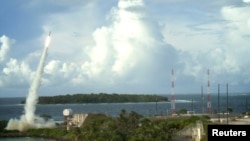China appears to be intensifying a diplomatic and cultural campaign against a U.S.-South Korean plan to deploy an American missile defense system in South Korea – a system Beijing sees as threatening its security.
Chinese Foreign Minister Wang Yi expressed “firm opposition” to the 2017 deployment of the Terminal High Altitude Area Defense (THAAD) system in a meeting with his South Korean counterpart Yun Byung-se in Tokyo on Wednesday, according to Chinese state news agency Xinhua. It was China’s first direct high-level diplomatic protest to South Korea about the THAAD plan since Seoul and Washington announced it on July 8. The two allies said the move is aimed at protecting South Korea and American troops stationed there from what they view as an enhanced threat of a North Korean ballistic missile attack.
Chinese television networks also have obscured or deleted images of South Korean K-Pop stars in their programs in recent weeks. Chinese state-run news site Global Times reported Wednesday that eastern China’s Jiangsu Television “cut shots or blurred the images” of ‘Gangnam Style’ singer Psy and musical group iKON in a reality show broadcast on August 21. In another case, Chinese online media site Sina reported this month that Zhejiang Television, also in eastern China, deleted some scenes of singer Hwang Chi-yeul and pixilated his image in other parts of an August 13 episode of its Challengers Union variety show.
Cultural retaliation?
Chinese and South Korean media outlets such as Global Times and Korea Joongang Daily have described the recent expunging of South Korean pop icons admired in China from Chinese television programs as part of an undeclared Beijing policy of punishing Seoul for agreeing to host the U.S. missile defense system. South Korean media also have reported that Chinese companies canceled several appearances by South Korean celebrities in China after the THAAD announcement. South Korean President Park Geun-hye said earlier this year that her country’s entertainment sector plays an “important” role in boosting South Korean exports and attracting tourists.
In an interview for VOA’s China 360 podcast, Korea analyst Scott Snyder of the Council on Foreign Relations said it is hard to draw a direct correlation between the misfortunes of the K-Pop stars in China and Beijing’s anger about the impending deployment of THAAD in South Korea.
“It is not uncommon to have sudden cancellations of Korean concerts in China because they are not necessarily a steady business,” Synder said.
But Snyder pointed to another apparent Chinese pressure tactic against Seoul: China announcing earlier this month a tightening of rules for South Korean tourists to apply for group visas to visit the country. “That probably is going to slow the volume of South Korean tourism to China," he said.
China’s complaint
Chinese Foreign Minister Wang reiterated the reasons for Beijing’s long-held opposition to the planned U.S. missile defense shield in South Korea last month. He said it will “exceed” Seoul’s defense needs, “undermine” China’s security interests and “shatter” the regional balance of power.
China is the only East Asian nation armed with nuclear missiles. In a separate VOA interview, Brad Glosserman, executive director of Hawaii-based foreign policy institute Pacific Forum, said Chinese leaders “fear that (THAAD) is a weapons system that can be used to neutralize their nuclear deterrent.”
But Chinese diplomatic protests and perceived acts of cultural retaliation have not persuaded Washington and Seoul to scrap the deployment.
Skeptical responses
Snyder said Beijing has miscalculated in its strategy. “The THAAD system’s radar could potentially cover parts of mainland China, but it would require changes in configuration to be able to defend against missiles from there,” he said. “So China’s objections have not held water for U.S. and South Korean military planners who are focused on a North Korean offensive missile threat.”
The Council on Foreign Relations analyst said China’s behavior also has raised doubts about whether it is objecting to THAAD for purely military reasons. "The telling component of the Chinese response has been that despite U.S. and South Korean offers to provide a technical briefing regarding THAAD’s capabilities, the Chinese have rejected those particular offers,” he said. “So it means that they are really viewing this deployment through a political lens." China’s angry response to the U.S.-South Korean THAAD agreement followed months of Chinese efforts to persuade South Korea not to boost its military alliance with the United States – Beijing’s longtime military and economic rival.
Do Chinese leaders have any other options for trying to counter the U.S. and South Korean missile defense plan? Snyder said he believes they do.
"Chinese military planners must be working on potential countermeasures that China might take in the event of a potential conflict with the United States, and focusing on questions of whether to target U.S. military bases in South Korea and Japan (also a U.S. ally),” he said. “This would be consistent with Chinese military planning related to the ability to defend their own areas and also to target U.S. aircraft carriers perceived as sources of potential offensive threat to China."
VOA's Victor Beattie contributed to this report.





